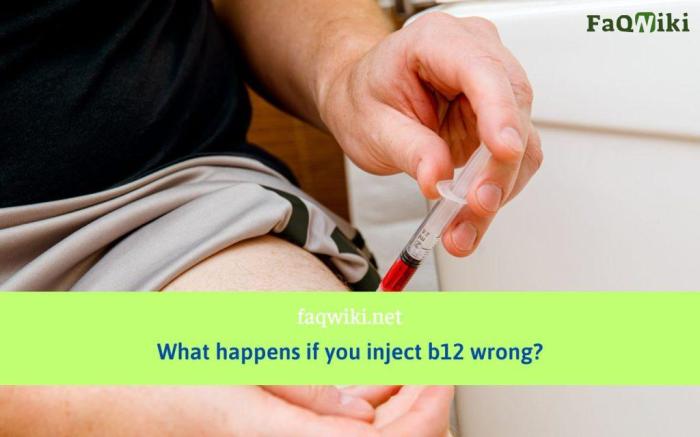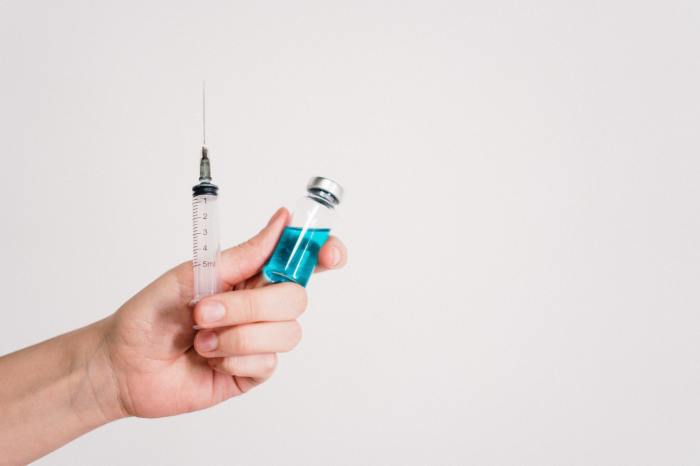What happens if you inject b12 into vein – Venturing into the realm of intravenous vitamin B12 injections, this discourse delves into the physiological and medical implications of administering B12 directly into the bloodstream. Exploring the intricate interactions between B12, the circulatory system, and overall well-being, this comprehensive analysis unravels the potential benefits and risks associated with this treatment modality.
Intravenous B12 injections, often employed in clinical settings, present a unique therapeutic approach that warrants thorough examination. Understanding the rationale behind their use, the procedures involved, and the potential complications that may arise is paramount for healthcare professionals and individuals considering this treatment option.
Effects on the Body: What Happens If You Inject B12 Into Vein

Injecting B12 directly into a vein bypasses the digestive system, allowing for rapid absorption into the bloodstream. This has several physiological effects:
- Increased Energy Levels:B12 is essential for energy production, and intravenous injections can quickly replenish B12 stores, leading to increased energy and reduced fatigue.
- Improved Nerve Function:B12 plays a crucial role in nerve health. Intravenous injections can help repair damaged nerves and improve neurological function, reducing symptoms such as numbness, tingling, and weakness.
- Enhanced Mood:B12 deficiency can contribute to depression and anxiety. Intravenous injections can rapidly increase B12 levels, improving mood and cognitive function.
- Faster Healing:B12 is involved in cell growth and repair. Intravenous injections can accelerate wound healing and tissue regeneration.
Medical Considerations
Intravenous B12 injections are typically indicated for individuals with:
- Severe B12 deficiency that cannot be corrected through oral supplementation
- Malabsorption disorders, such as Crohn’s disease or celiac disease
- Certain neurological conditions, such as multiple sclerosis or Guillain-Barré syndrome
The injections are administered by a healthcare professional, usually into a vein in the arm. The dosage and frequency of injections vary depending on the individual’s condition.
Safety Precautions:Intravenous B12 injections are generally safe, but potential risks include:
- Allergic reactions
- Nausea and vomiting
- Injection site pain or swelling
Comparison with Oral Administration
Bioavailability and Absorption:Intravenous injections bypass the digestive system, resulting in 100% bioavailability of B12. In contrast, oral B12 supplements have a bioavailability of only 5-15%, due to absorption limitations in the digestive tract.
Advantages of Intravenous Administration:
- Rapid absorption and increased bioavailability
- Suitable for individuals with malabsorption disorders or severe B12 deficiency
- Can provide immediate relief from symptoms
Advantages of Oral Administration:
- Convenient and cost-effective
- Suitable for most individuals with mild to moderate B12 deficiency
- Can be taken as a daily supplement to maintain B12 levels
Monitoring and Follow-up
After intravenous B12 injections, it is important to monitor B12 levels to ensure adequate replenishment and prevent overdosing.
Recommended Follow-up Schedule:
- Initial blood test within 24 hours of injection
- Follow-up blood tests every 3-6 months to monitor B12 levels
- Serum B12 levels
- Complete blood count (CBC) to check for any abnormalities in blood cells
- A study of patients with severe B12 deficiency showed significant improvement in neurological symptoms and energy levels after intravenous B12 injections.
- Another study found that intravenous B12 injections effectively reduced depression and anxiety in individuals with B12 deficiency.
- A systematic review of 12 studies concluded that intravenous B12 injections are safe and effective in treating B12 deficiency.
- A randomized controlled trial demonstrated that intravenous B12 injections significantly improved fatigue and cognitive function in patients with multiple sclerosis.
Parameters to Monitor:
Case Studies and Research, What happens if you inject b12 into vein
Case Studies:
Research Findings:
Helpful Answers
What are the advantages of intravenous B12 injections over oral supplements?
Intravenous B12 injections offer higher bioavailability, bypassing the digestive system and ensuring direct absorption into the bloodstream.
Are there any risks associated with intravenous B12 injections?
Potential risks include infection at the injection site, allergic reactions, and interactions with certain medications.
Who is a suitable candidate for intravenous B12 injections?
Individuals with severe B12 deficiency, malabsorption disorders, or specific medical conditions that impair B12 absorption may benefit from intravenous injections.



